LSC UoS BA: UK Employment Law Structure & CSR in Business Ethics
VerifiedAdded on 2023/06/10
|6
|1877
|326
Essay
AI Summary
This essay provides an analysis of the UK's employment law structure, discussing whether it favors employers or employees, and examines the extent to which corporations take Corporate Social Responsibility (CSR) seriously. It covers key aspects of employment law, including working hours, maternity leave, equal pay, and anti-discrimination laws, referencing relevant legislation such as the Employment Relations Act 1999 and the Equality Act 2010. The essay further explores the growing focus on CSR, highlighting its benefits in attracting shareholders and improving employee morale, while also acknowledging the challenges faced by small and medium-sized enterprises in implementing CSR initiatives due to financial constraints and potential corruption. The conclusion emphasizes the importance of maintaining a balance between employer and employee rights and responsibilities, supported by a list of references.
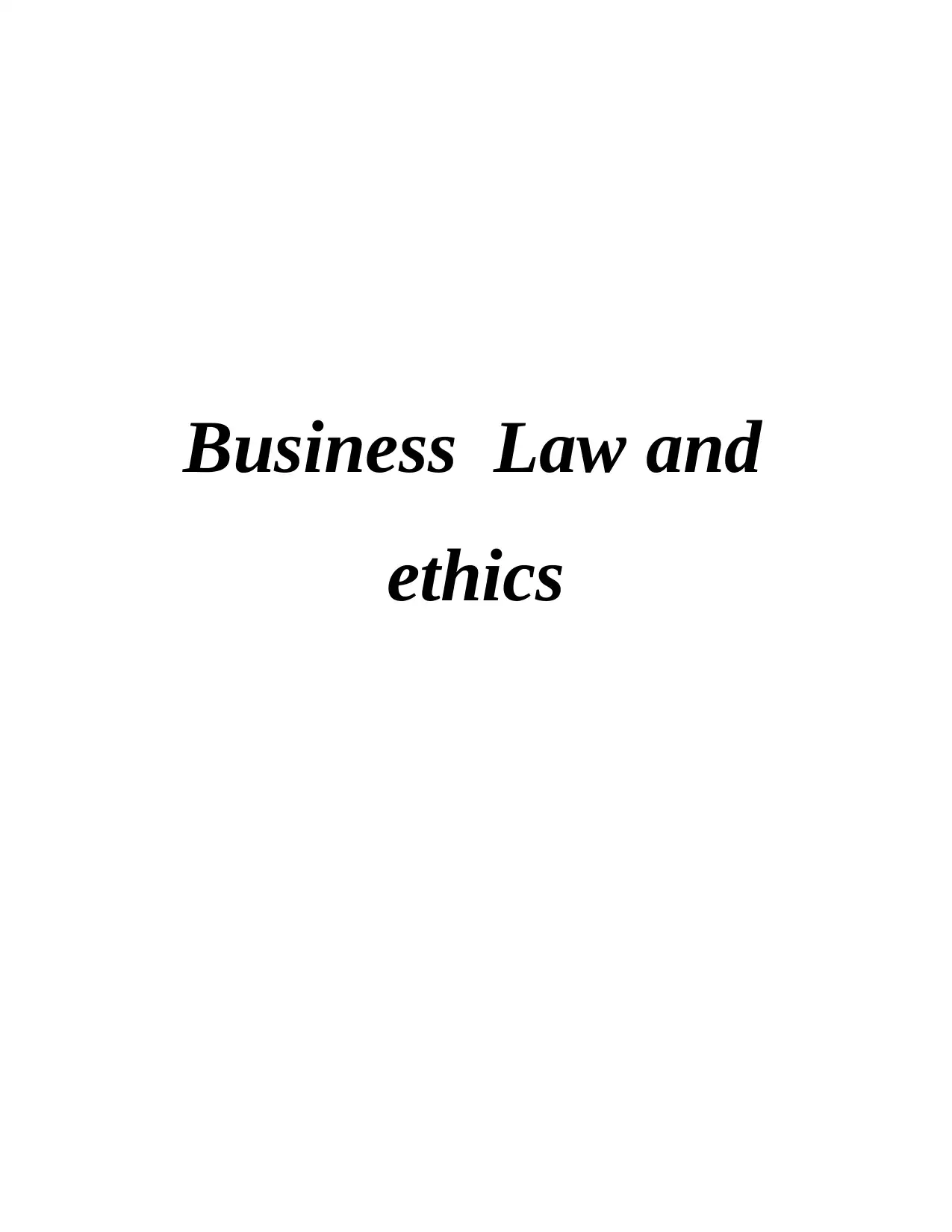
Business Law and
ethics
ethics
Paraphrase This Document
Need a fresh take? Get an instant paraphrase of this document with our AI Paraphraser
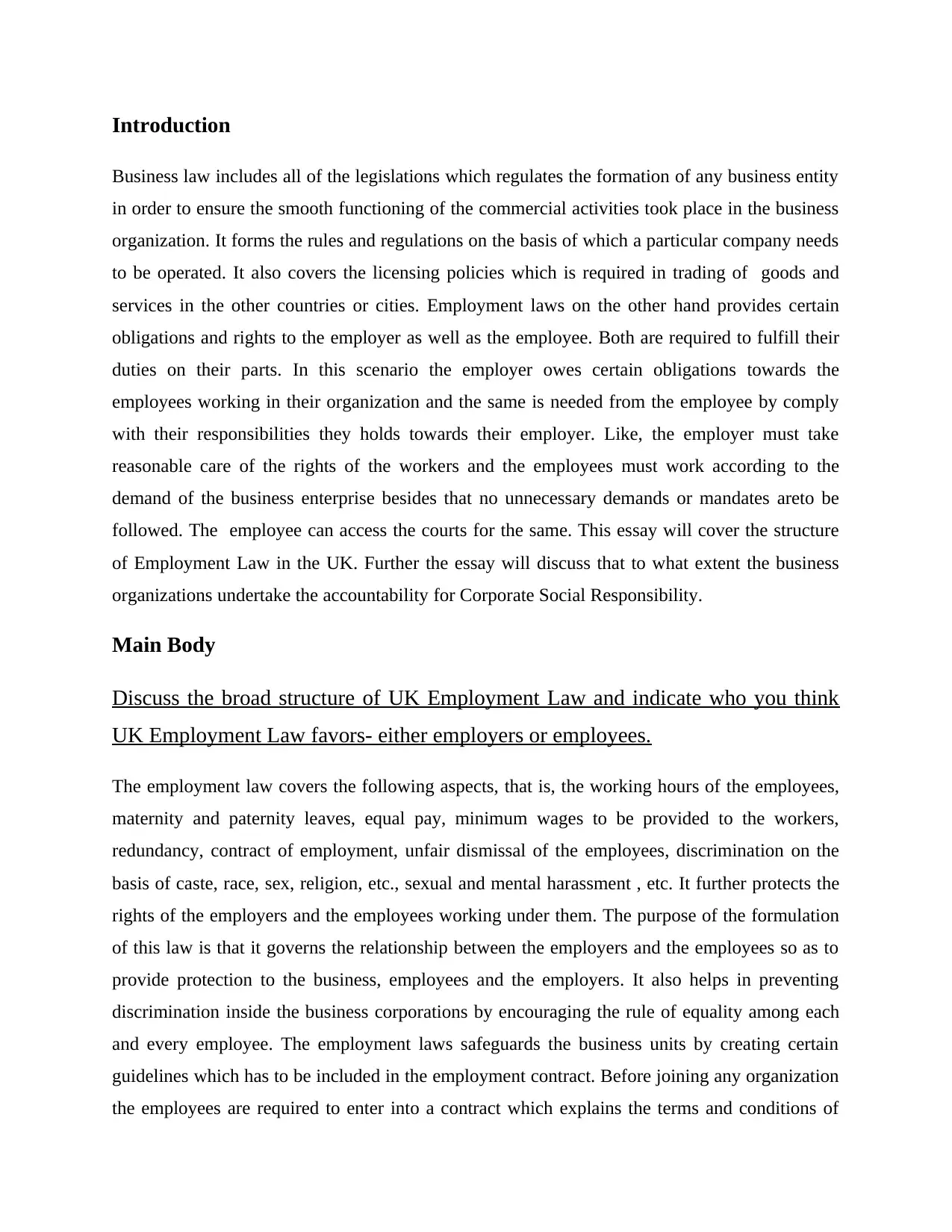
Introduction
Business law includes all of the legislations which regulates the formation of any business entity
in order to ensure the smooth functioning of the commercial activities took place in the business
organization. It forms the rules and regulations on the basis of which a particular company needs
to be operated. It also covers the licensing policies which is required in trading of goods and
services in the other countries or cities. Employment laws on the other hand provides certain
obligations and rights to the employer as well as the employee. Both are required to fulfill their
duties on their parts. In this scenario the employer owes certain obligations towards the
employees working in their organization and the same is needed from the employee by comply
with their responsibilities they holds towards their employer. Like, the employer must take
reasonable care of the rights of the workers and the employees must work according to the
demand of the business enterprise besides that no unnecessary demands or mandates areto be
followed. The employee can access the courts for the same. This essay will cover the structure
of Employment Law in the UK. Further the essay will discuss that to what extent the business
organizations undertake the accountability for Corporate Social Responsibility.
Main Body
Discuss the broad structure of UK Employment Law and indicate who you think
UK Employment Law favors- either employers or employees.
The employment law covers the following aspects, that is, the working hours of the employees,
maternity and paternity leaves, equal pay, minimum wages to be provided to the workers,
redundancy, contract of employment, unfair dismissal of the employees, discrimination on the
basis of caste, race, sex, religion, etc., sexual and mental harassment , etc. It further protects the
rights of the employers and the employees working under them. The purpose of the formulation
of this law is that it governs the relationship between the employers and the employees so as to
provide protection to the business, employees and the employers. It also helps in preventing
discrimination inside the business corporations by encouraging the rule of equality among each
and every employee. The employment laws safeguards the business units by creating certain
guidelines which has to be included in the employment contract. Before joining any organization
the employees are required to enter into a contract which explains the terms and conditions of
Business law includes all of the legislations which regulates the formation of any business entity
in order to ensure the smooth functioning of the commercial activities took place in the business
organization. It forms the rules and regulations on the basis of which a particular company needs
to be operated. It also covers the licensing policies which is required in trading of goods and
services in the other countries or cities. Employment laws on the other hand provides certain
obligations and rights to the employer as well as the employee. Both are required to fulfill their
duties on their parts. In this scenario the employer owes certain obligations towards the
employees working in their organization and the same is needed from the employee by comply
with their responsibilities they holds towards their employer. Like, the employer must take
reasonable care of the rights of the workers and the employees must work according to the
demand of the business enterprise besides that no unnecessary demands or mandates areto be
followed. The employee can access the courts for the same. This essay will cover the structure
of Employment Law in the UK. Further the essay will discuss that to what extent the business
organizations undertake the accountability for Corporate Social Responsibility.
Main Body
Discuss the broad structure of UK Employment Law and indicate who you think
UK Employment Law favors- either employers or employees.
The employment law covers the following aspects, that is, the working hours of the employees,
maternity and paternity leaves, equal pay, minimum wages to be provided to the workers,
redundancy, contract of employment, unfair dismissal of the employees, discrimination on the
basis of caste, race, sex, religion, etc., sexual and mental harassment , etc. It further protects the
rights of the employers and the employees working under them. The purpose of the formulation
of this law is that it governs the relationship between the employers and the employees so as to
provide protection to the business, employees and the employers. It also helps in preventing
discrimination inside the business corporations by encouraging the rule of equality among each
and every employee. The employment laws safeguards the business units by creating certain
guidelines which has to be included in the employment contract. Before joining any organization
the employees are required to enter into a contract which explains the terms and conditions of
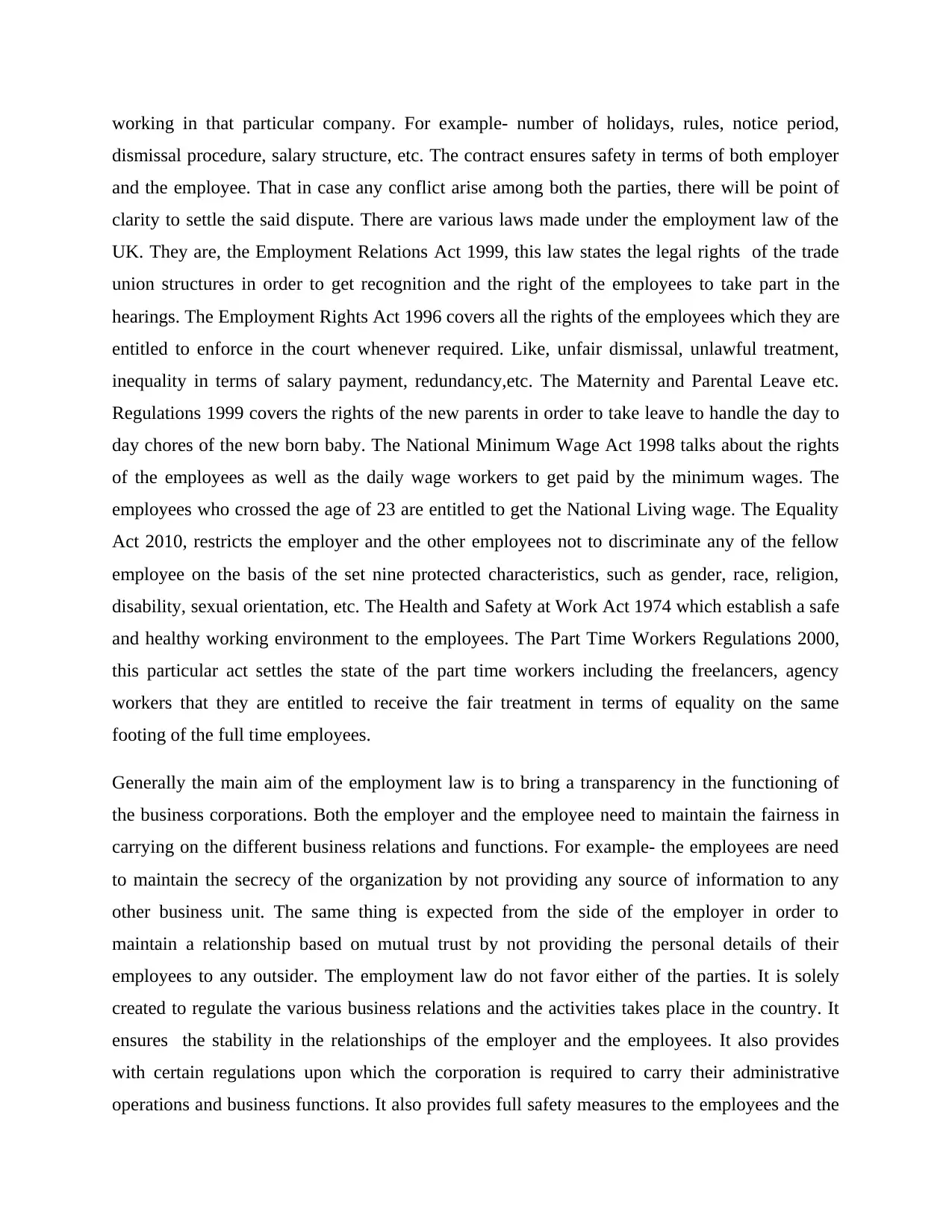
working in that particular company. For example- number of holidays, rules, notice period,
dismissal procedure, salary structure, etc. The contract ensures safety in terms of both employer
and the employee. That in case any conflict arise among both the parties, there will be point of
clarity to settle the said dispute. There are various laws made under the employment law of the
UK. They are, the Employment Relations Act 1999, this law states the legal rights of the trade
union structures in order to get recognition and the right of the employees to take part in the
hearings. The Employment Rights Act 1996 covers all the rights of the employees which they are
entitled to enforce in the court whenever required. Like, unfair dismissal, unlawful treatment,
inequality in terms of salary payment, redundancy,etc. The Maternity and Parental Leave etc.
Regulations 1999 covers the rights of the new parents in order to take leave to handle the day to
day chores of the new born baby. The National Minimum Wage Act 1998 talks about the rights
of the employees as well as the daily wage workers to get paid by the minimum wages. The
employees who crossed the age of 23 are entitled to get the National Living wage. The Equality
Act 2010, restricts the employer and the other employees not to discriminate any of the fellow
employee on the basis of the set nine protected characteristics, such as gender, race, religion,
disability, sexual orientation, etc. The Health and Safety at Work Act 1974 which establish a safe
and healthy working environment to the employees. The Part Time Workers Regulations 2000,
this particular act settles the state of the part time workers including the freelancers, agency
workers that they are entitled to receive the fair treatment in terms of equality on the same
footing of the full time employees.
Generally the main aim of the employment law is to bring a transparency in the functioning of
the business corporations. Both the employer and the employee need to maintain the fairness in
carrying on the different business relations and functions. For example- the employees are need
to maintain the secrecy of the organization by not providing any source of information to any
other business unit. The same thing is expected from the side of the employer in order to
maintain a relationship based on mutual trust by not providing the personal details of their
employees to any outsider. The employment law do not favor either of the parties. It is solely
created to regulate the various business relations and the activities takes place in the country. It
ensures the stability in the relationships of the employer and the employees. It also provides
with certain regulations upon which the corporation is required to carry their administrative
operations and business functions. It also provides full safety measures to the employees and the
dismissal procedure, salary structure, etc. The contract ensures safety in terms of both employer
and the employee. That in case any conflict arise among both the parties, there will be point of
clarity to settle the said dispute. There are various laws made under the employment law of the
UK. They are, the Employment Relations Act 1999, this law states the legal rights of the trade
union structures in order to get recognition and the right of the employees to take part in the
hearings. The Employment Rights Act 1996 covers all the rights of the employees which they are
entitled to enforce in the court whenever required. Like, unfair dismissal, unlawful treatment,
inequality in terms of salary payment, redundancy,etc. The Maternity and Parental Leave etc.
Regulations 1999 covers the rights of the new parents in order to take leave to handle the day to
day chores of the new born baby. The National Minimum Wage Act 1998 talks about the rights
of the employees as well as the daily wage workers to get paid by the minimum wages. The
employees who crossed the age of 23 are entitled to get the National Living wage. The Equality
Act 2010, restricts the employer and the other employees not to discriminate any of the fellow
employee on the basis of the set nine protected characteristics, such as gender, race, religion,
disability, sexual orientation, etc. The Health and Safety at Work Act 1974 which establish a safe
and healthy working environment to the employees. The Part Time Workers Regulations 2000,
this particular act settles the state of the part time workers including the freelancers, agency
workers that they are entitled to receive the fair treatment in terms of equality on the same
footing of the full time employees.
Generally the main aim of the employment law is to bring a transparency in the functioning of
the business corporations. Both the employer and the employee need to maintain the fairness in
carrying on the different business relations and functions. For example- the employees are need
to maintain the secrecy of the organization by not providing any source of information to any
other business unit. The same thing is expected from the side of the employer in order to
maintain a relationship based on mutual trust by not providing the personal details of their
employees to any outsider. The employment law do not favor either of the parties. It is solely
created to regulate the various business relations and the activities takes place in the country. It
ensures the stability in the relationships of the employer and the employees. It also provides
with certain regulations upon which the corporation is required to carry their administrative
operations and business functions. It also provides full safety measures to the employees and the
⊘ This is a preview!⊘
Do you want full access?
Subscribe today to unlock all pages.

Trusted by 1+ million students worldwide
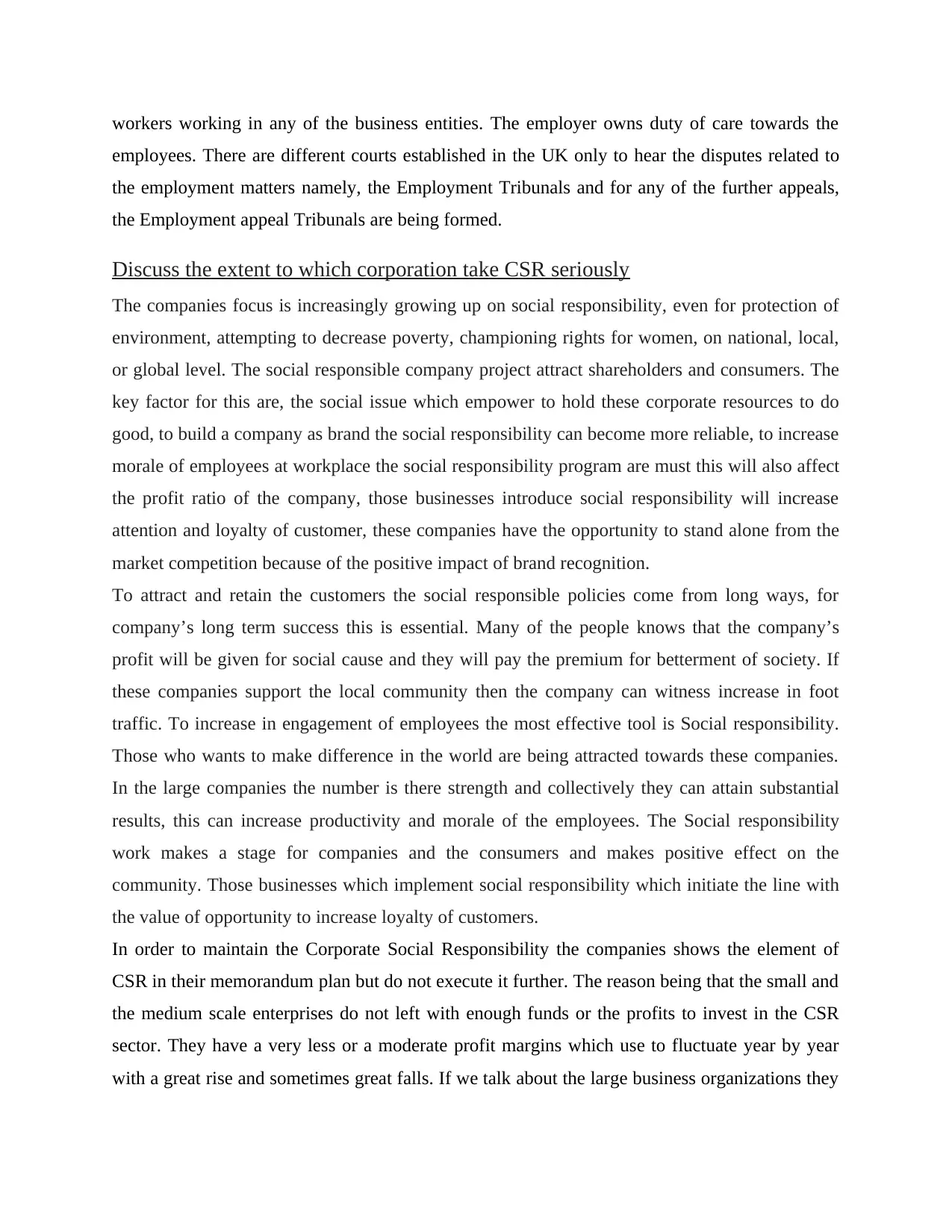
workers working in any of the business entities. The employer owns duty of care towards the
employees. There are different courts established in the UK only to hear the disputes related to
the employment matters namely, the Employment Tribunals and for any of the further appeals,
the Employment appeal Tribunals are being formed.
Discuss the extent to which corporation take CSR seriously
The companies focus is increasingly growing up on social responsibility, even for protection of
environment, attempting to decrease poverty, championing rights for women, on national, local,
or global level. The social responsible company project attract shareholders and consumers. The
key factor for this are, the social issue which empower to hold these corporate resources to do
good, to build a company as brand the social responsibility can become more reliable, to increase
morale of employees at workplace the social responsibility program are must this will also affect
the profit ratio of the company, those businesses introduce social responsibility will increase
attention and loyalty of customer, these companies have the opportunity to stand alone from the
market competition because of the positive impact of brand recognition.
To attract and retain the customers the social responsible policies come from long ways, for
company’s long term success this is essential. Many of the people knows that the company’s
profit will be given for social cause and they will pay the premium for betterment of society. If
these companies support the local community then the company can witness increase in foot
traffic. To increase in engagement of employees the most effective tool is Social responsibility.
Those who wants to make difference in the world are being attracted towards these companies.
In the large companies the number is there strength and collectively they can attain substantial
results, this can increase productivity and morale of the employees. The Social responsibility
work makes a stage for companies and the consumers and makes positive effect on the
community. Those businesses which implement social responsibility which initiate the line with
the value of opportunity to increase loyalty of customers.
In order to maintain the Corporate Social Responsibility the companies shows the element of
CSR in their memorandum plan but do not execute it further. The reason being that the small and
the medium scale enterprises do not left with enough funds or the profits to invest in the CSR
sector. They have a very less or a moderate profit margins which use to fluctuate year by year
with a great rise and sometimes great falls. If we talk about the large business organizations they
employees. There are different courts established in the UK only to hear the disputes related to
the employment matters namely, the Employment Tribunals and for any of the further appeals,
the Employment appeal Tribunals are being formed.
Discuss the extent to which corporation take CSR seriously
The companies focus is increasingly growing up on social responsibility, even for protection of
environment, attempting to decrease poverty, championing rights for women, on national, local,
or global level. The social responsible company project attract shareholders and consumers. The
key factor for this are, the social issue which empower to hold these corporate resources to do
good, to build a company as brand the social responsibility can become more reliable, to increase
morale of employees at workplace the social responsibility program are must this will also affect
the profit ratio of the company, those businesses introduce social responsibility will increase
attention and loyalty of customer, these companies have the opportunity to stand alone from the
market competition because of the positive impact of brand recognition.
To attract and retain the customers the social responsible policies come from long ways, for
company’s long term success this is essential. Many of the people knows that the company’s
profit will be given for social cause and they will pay the premium for betterment of society. If
these companies support the local community then the company can witness increase in foot
traffic. To increase in engagement of employees the most effective tool is Social responsibility.
Those who wants to make difference in the world are being attracted towards these companies.
In the large companies the number is there strength and collectively they can attain substantial
results, this can increase productivity and morale of the employees. The Social responsibility
work makes a stage for companies and the consumers and makes positive effect on the
community. Those businesses which implement social responsibility which initiate the line with
the value of opportunity to increase loyalty of customers.
In order to maintain the Corporate Social Responsibility the companies shows the element of
CSR in their memorandum plan but do not execute it further. The reason being that the small and
the medium scale enterprises do not left with enough funds or the profits to invest in the CSR
sector. They have a very less or a moderate profit margins which use to fluctuate year by year
with a great rise and sometimes great falls. If we talk about the large business organizations they
Paraphrase This Document
Need a fresh take? Get an instant paraphrase of this document with our AI Paraphraser
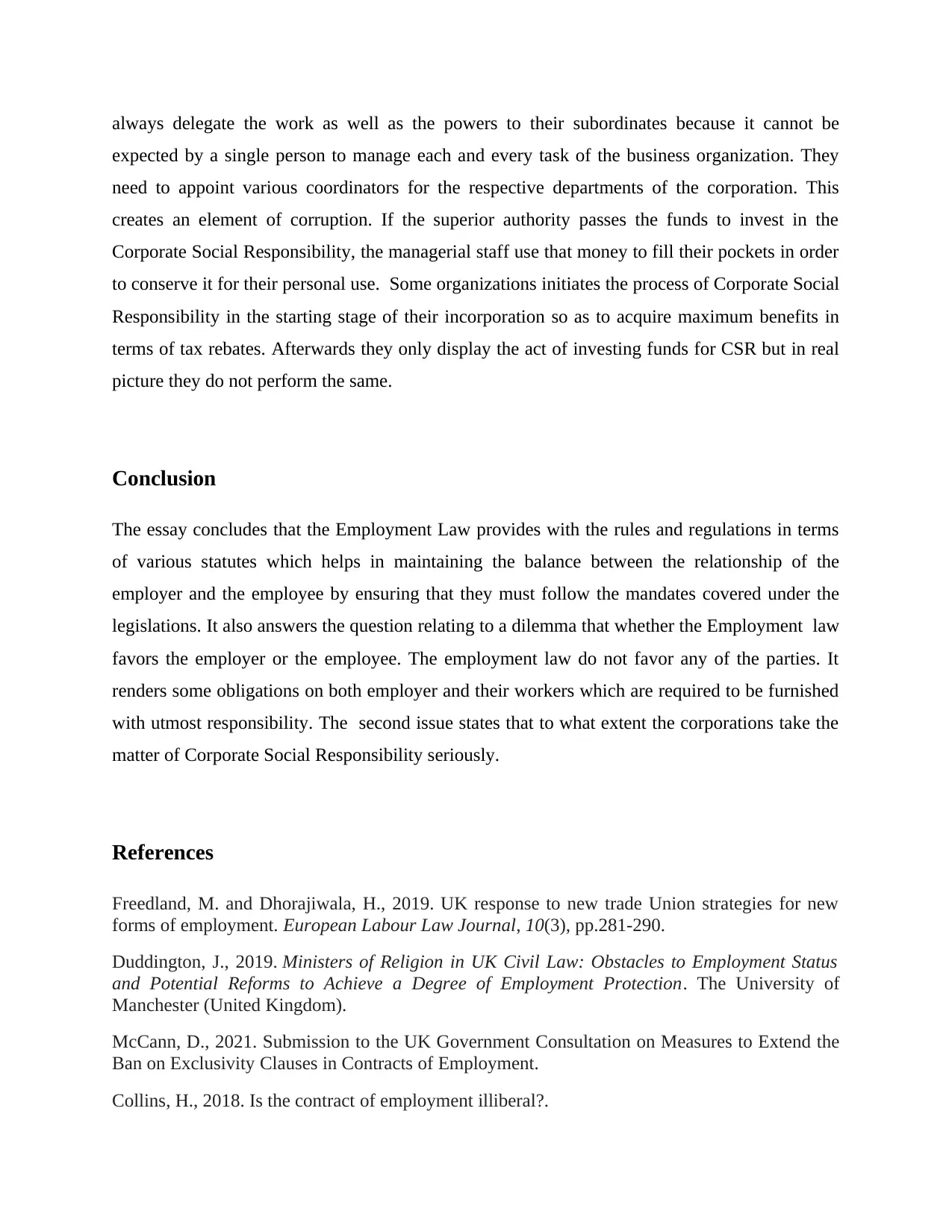
always delegate the work as well as the powers to their subordinates because it cannot be
expected by a single person to manage each and every task of the business organization. They
need to appoint various coordinators for the respective departments of the corporation. This
creates an element of corruption. If the superior authority passes the funds to invest in the
Corporate Social Responsibility, the managerial staff use that money to fill their pockets in order
to conserve it for their personal use. Some organizations initiates the process of Corporate Social
Responsibility in the starting stage of their incorporation so as to acquire maximum benefits in
terms of tax rebates. Afterwards they only display the act of investing funds for CSR but in real
picture they do not perform the same.
Conclusion
The essay concludes that the Employment Law provides with the rules and regulations in terms
of various statutes which helps in maintaining the balance between the relationship of the
employer and the employee by ensuring that they must follow the mandates covered under the
legislations. It also answers the question relating to a dilemma that whether the Employment law
favors the employer or the employee. The employment law do not favor any of the parties. It
renders some obligations on both employer and their workers which are required to be furnished
with utmost responsibility. The second issue states that to what extent the corporations take the
matter of Corporate Social Responsibility seriously.
References
Freedland, M. and Dhorajiwala, H., 2019. UK response to new trade Union strategies for new
forms of employment. European Labour Law Journal, 10(3), pp.281-290.
Duddington, J., 2019. Ministers of Religion in UK Civil Law: Obstacles to Employment Status
and Potential Reforms to Achieve a Degree of Employment Protection. The University of
Manchester (United Kingdom).
McCann, D., 2021. Submission to the UK Government Consultation on Measures to Extend the
Ban on Exclusivity Clauses in Contracts of Employment.
Collins, H., 2018. Is the contract of employment illiberal?.
expected by a single person to manage each and every task of the business organization. They
need to appoint various coordinators for the respective departments of the corporation. This
creates an element of corruption. If the superior authority passes the funds to invest in the
Corporate Social Responsibility, the managerial staff use that money to fill their pockets in order
to conserve it for their personal use. Some organizations initiates the process of Corporate Social
Responsibility in the starting stage of their incorporation so as to acquire maximum benefits in
terms of tax rebates. Afterwards they only display the act of investing funds for CSR but in real
picture they do not perform the same.
Conclusion
The essay concludes that the Employment Law provides with the rules and regulations in terms
of various statutes which helps in maintaining the balance between the relationship of the
employer and the employee by ensuring that they must follow the mandates covered under the
legislations. It also answers the question relating to a dilemma that whether the Employment law
favors the employer or the employee. The employment law do not favor any of the parties. It
renders some obligations on both employer and their workers which are required to be furnished
with utmost responsibility. The second issue states that to what extent the corporations take the
matter of Corporate Social Responsibility seriously.
References
Freedland, M. and Dhorajiwala, H., 2019. UK response to new trade Union strategies for new
forms of employment. European Labour Law Journal, 10(3), pp.281-290.
Duddington, J., 2019. Ministers of Religion in UK Civil Law: Obstacles to Employment Status
and Potential Reforms to Achieve a Degree of Employment Protection. The University of
Manchester (United Kingdom).
McCann, D., 2021. Submission to the UK Government Consultation on Measures to Extend the
Ban on Exclusivity Clauses in Contracts of Employment.
Collins, H., 2018. Is the contract of employment illiberal?.
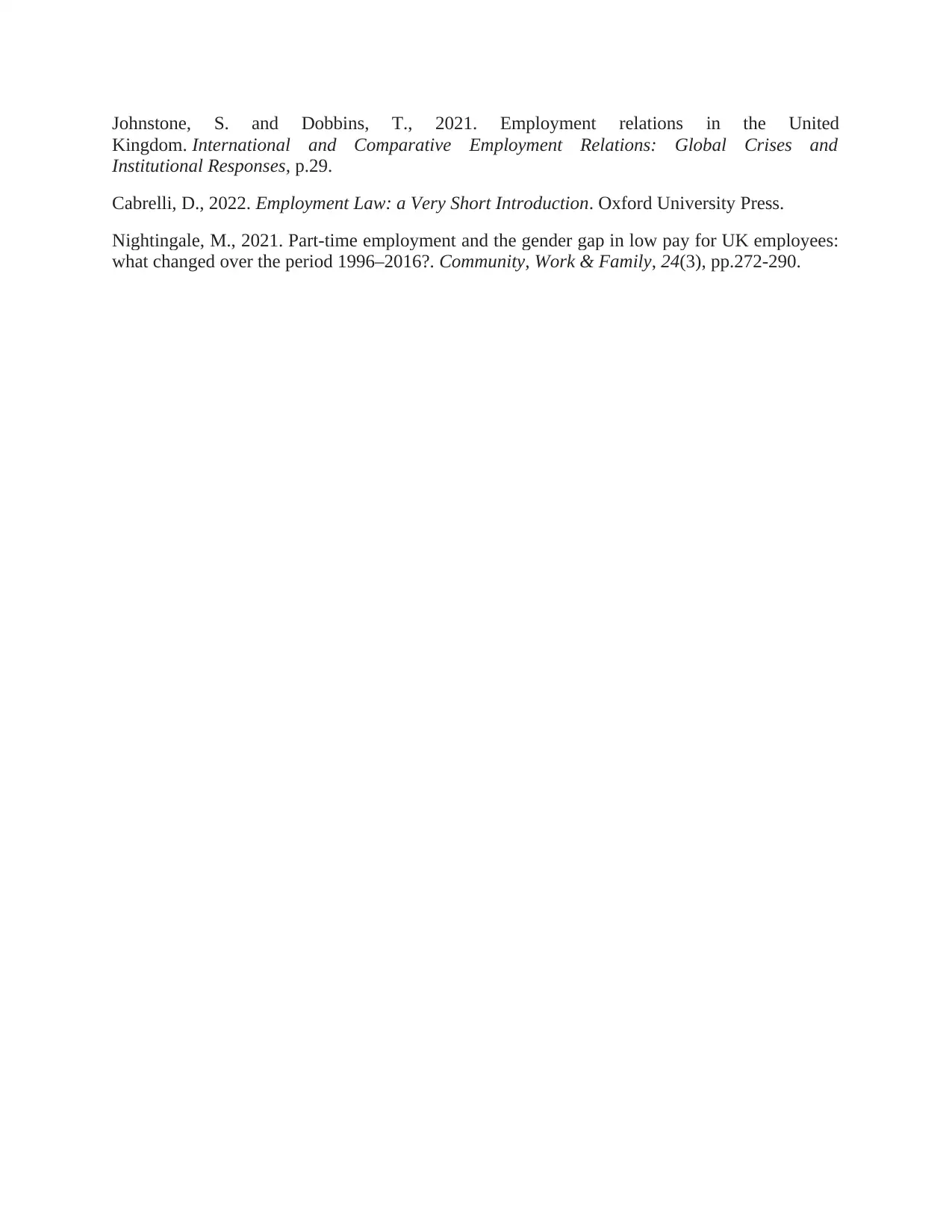
Johnstone, S. and Dobbins, T., 2021. Employment relations in the United
Kingdom. International and Comparative Employment Relations: Global Crises and
Institutional Responses, p.29.
Cabrelli, D., 2022. Employment Law: a Very Short Introduction. Oxford University Press.
Nightingale, M., 2021. Part-time employment and the gender gap in low pay for UK employees:
what changed over the period 1996–2016?. Community, Work & Family, 24(3), pp.272-290.
Kingdom. International and Comparative Employment Relations: Global Crises and
Institutional Responses, p.29.
Cabrelli, D., 2022. Employment Law: a Very Short Introduction. Oxford University Press.
Nightingale, M., 2021. Part-time employment and the gender gap in low pay for UK employees:
what changed over the period 1996–2016?. Community, Work & Family, 24(3), pp.272-290.
⊘ This is a preview!⊘
Do you want full access?
Subscribe today to unlock all pages.

Trusted by 1+ million students worldwide
1 out of 6
Related Documents
Your All-in-One AI-Powered Toolkit for Academic Success.
+13062052269
info@desklib.com
Available 24*7 on WhatsApp / Email
![[object Object]](/_next/static/media/star-bottom.7253800d.svg)
Unlock your academic potential
Copyright © 2020–2026 A2Z Services. All Rights Reserved. Developed and managed by ZUCOL.

